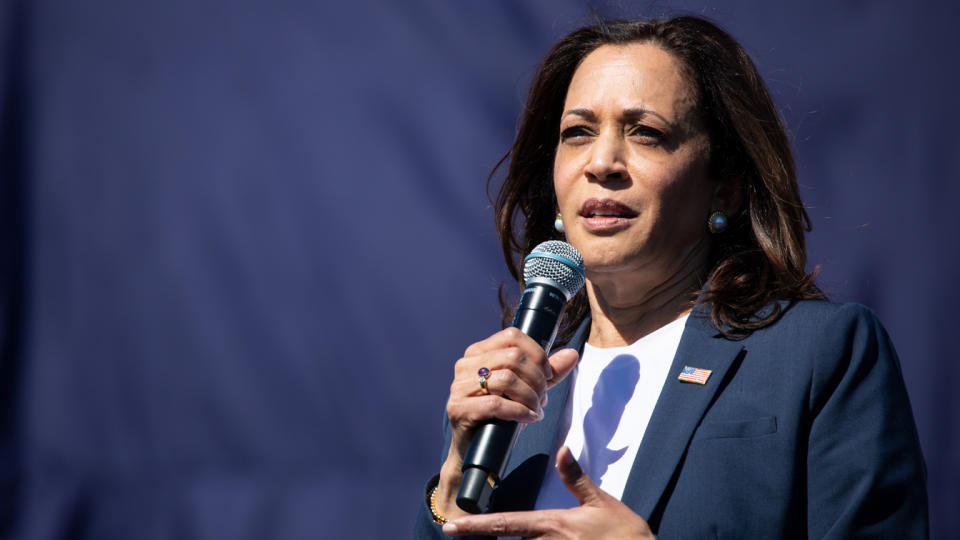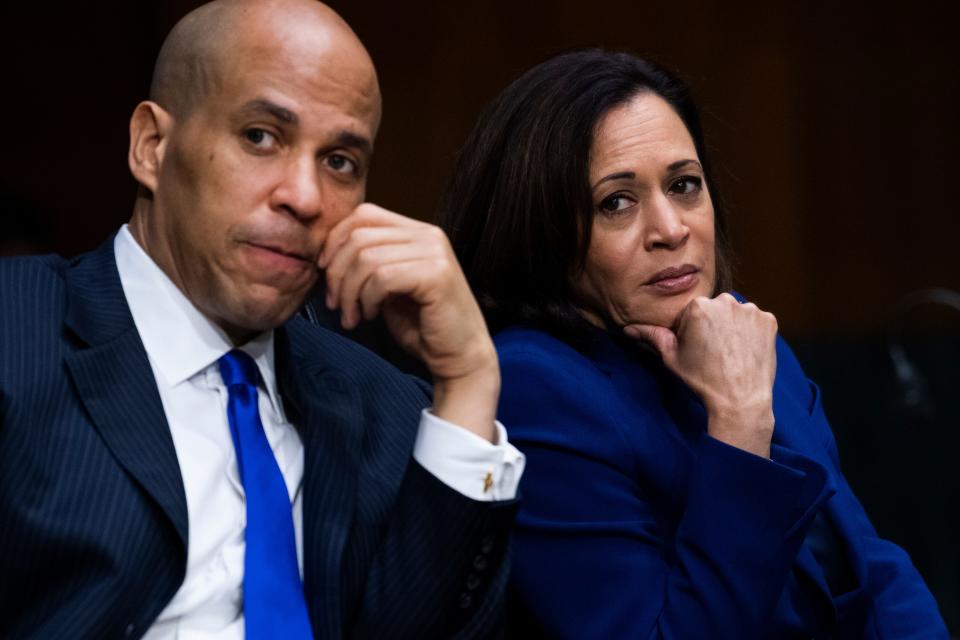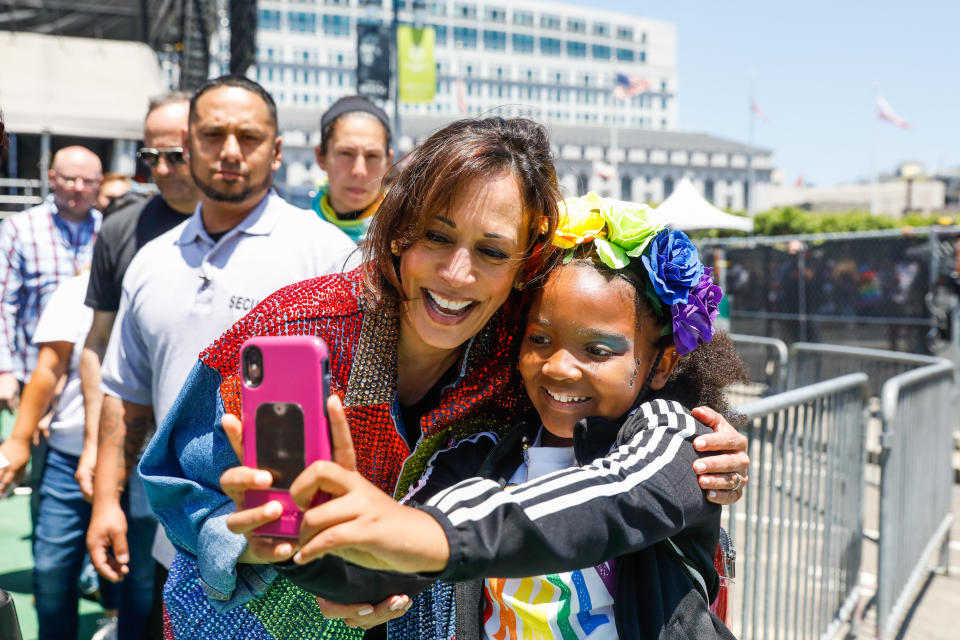'She will shake the table': Black lawmakers explain what Kamala Harris means to them
- Oops!Something went wrong.Please try again later.
WILMINGTON, Del. — “Twice as hard, half as much.”
That’s a near-universal mantra drilled into the heads of non-white Americans when they are children. It’s one of many talks passed down from generation to generation of Black and brown kids, an instruction that they may have to settle for less than their white colleagues, classmates and friends, despite exerting the same — or more — effort.
Despite shattering what was thought by some to be a near impenetrable glass ceiling — a Black man, with a non-Western sounding name, winning over the most powerful political office in the world — President Barack Obama repeated the message during a commencement address at Morehouse College, a historically Black school, in 2013. And in her popular memoir, “Becoming,” former first lady Michelle Obama offered near identical advice.

But times are changing. The current Congress is the most racially and ethnically diverse in U.S. history. For the first time, as the country is rife with racial turmoil, a vice presidential nominee on a major party ticket is a woman of color.
More than five decades after the heyday of the civil rights movement, Black lawmakers from across the country say the nomination of California Sen. Kamala Harris, a biracial Black and South Asian woman, has given them hope that future generations of minority youth will have political leaders that look like they do.
“I cannot tell you how exciting that was for me. It was almost like I didn’t know her. It inspired me all over again,” Prince George’s County, Md., County Executive Angela Alsobrooks, a longtime friend of Harris, told Yahoo News.
Alsobrooks, much like Harris, is a politician of several “firsts.” The Maryland legislator was the first Black woman elected state’s attorney of Prince George’s County — the top prosecutorial role in one of the most affluent Black counties in the United States. She is also the first woman to become the county executive of Prince George.
The two connected after Harris called Alsobrooks out of the blue after hearing that she was a fan of some of Harris’s California initiatives. Alsobrooks considers Harris a big sister figure, and recalls a lesson that Harris passed on from her mother: “It’s not as important to be the first at something as it is to perform the job with such excellence that you shall not be the last.”
Like other Black lawmakers, Alsobrooks describes being overcome with emotion when she found out that Harris would be the Democratic nominee for vice president.
“It gave me this motivation that's pretty hard to describe. I think that Black women all over the country had to have felt what I felt that day,” said Alsobrooks. “If any woman should ever have a doubt ever again, they now see that it’s not only that we can make it to that stage. But as Kamala said, ‘We will make sure you’re not the last.’ ... I think that's the image that will never go away.”
When Harris, along with five other women, ran for president during the Democratic primary, they were asked to duel with an invisible enemy: the concept of “electability.” Reporters and voters wondered openly if the country was read to elect a woman president after Hillary Clinton’s surprise 2016 loss.
Many of the women who were running for president this year argued it was nearly impossible to argue they were electable without falling into traps — and tropes — that they had been fighting to overcome their entire careers.

Rep. Terri Sewell, who in 2011 became the first Black woman to represent Alabama in Congress, said Harris has already proven that the electability question is outdated.
“This represents a real sea change in how Black women will be viewed going forward in terms of our electability and our ability to deliver on the promise that is America,” said Sewell, who is an alumna of the same historically Black sorority as Harris, Alpha Kappa Alpha.
“I often say that you have to see it, touch it, feel it to believe it's possible, and to that extent — having a role model in my mom, who was the first elected woman on the city council in Selma, Alabama — was really great. But to have someone in national office already elected in such a high office as vice president, clearly had been a great inspiration as well,” Sewell added.
Harris was one of two major Black candidates vying for the Democratic nomination. The other, New Jersey Sen. Cory Booker, suspended his campaign in January 2020, a month after Harris dropped out of the race. He recalled to Yahoo News the disappointment he heard from members of his community the moment Harris left the race, citing a lack of funding.
“The volcano of discontent I heard some Black people in my world, family members, people supporting me were upset, angry that day,” Booker explained. “And that was when I really knew how deep people's connection to her, especially women of color, really was.”

Shortly after Biden announced his pick, Booker saw a photo of a friend’s young daughter watching clips of Harris on television. He texted the photo to Harris with the message: “There are millions of girls and boys who are going to see you and ... believe in the power of their own dreams.”
“This is culturally more powerful than, I think, many really understand. What it’s going to mean for four-plus years to have her daily in all of our lives,” Booker told Yahoo News.
“I think that this is going to be a really powerful moment in history for people, because she can be approached by so many different directions that people feel connected to her. The people who are immigrants, people who are women, people who are Black, people who are Indian, people who felt that the mainstream story of America had not necessarily included their story. I think that this is going to be one of those moments where a lot more people are going to feel that sense of inclusion that you don’t always get from American politics.”
And when he heard Harris had been chosen by Joe Biden to be his running mate, Booker said he “felt our ancestors rising up in glory.”
“I just felt so, so much deep affection and appreciation that we had gotten to this moment in American history where someone has her talent and a skill and expertise and decency, and also being a Black woman, that she could have said to that spot.”
He added: “We are not in the promised land yet. We're not at the mountaintop, but this is a physical signpost that we are dancing on the right road.”
For Massachusetts Rep. Ayanna Pressley, one of the most important aspects of Harris’s rise is that she will be able to share her perspective in rooms that, within living memory, were occupied exclusively by white men.

“The power of diversity and representation is not so that we can applaud this progress; it is not for celebratory moments on the symbolism alone — although that is significant, anytime we make gains and strides in real life with leadership parity when it comes to gender and race — but to me it is really about what happens in those policy-making rooms, because we have seen the impact of policies that are developed by completely homogenized, monolithic viewpoint,” said Pressley.
Pressley, the first Black woman elected to the Boston City Council before becoming the first Black woman elected to Congress from Massachusetts, noted that she has experienced this firsthand. At her first budget committed after taking office, she recalled, Pressley asked her colleagues about what resources were being allocated to help young girls in the city. They “barely had monosyllabic answers” at first, but at their next meeting, her colleagues were suddenly prepared to address the subject.
“She will shake the table,” Pressley said of Harris. “And she will bring all of us into that room.”
But a candidate’s Blackness — especially if an individual is mixed-race — can still prove to be a political liability in the U.S. Barack Obama, the son of a white mother and a Black Kenyan father, spent years dealing with racist claims that he was not born in the country and was therefore ineligible for the presidency. Donald Trump, then a private citizen, was one of the most outspoken proponents of this bogus conspiracy theory.
Obama, who was raised primarily by white relatives, faced arguments from members of the African-American community that he wasn’t “Black enough.” Harris was met with similar criticism during the primary, much of it amplified by social media troll accounts, far-right provocateurs and Trump’s oldest son.

Both Obama and Harris are children of Black immigrants, and faced some nuanced critiques from Black Americans who felt that either’s respective upbringings were a far cry from the typical African American experience. Yet with over 45 million Black-identifying people living in the U.S., it’s impossible to say that the community’s experience is anything close to uniform.
When asked about questions of her heritage the hosts of “The Breakfast Club,” a popular radio show focused on Black issues, Harris didn’t mince words about her identity: “I was born Black. I will die Black, and I’m not going to make excuses for anybody because they do not understand.”
Friends and colleagues of Harris tell Yahoo News that she’s long been used to questions about her identity. And according to Pressley, such challenges are “par for the course anytime you are blazing a trail.”
“She has, throughout her career and life in public service, always been a first,” said Pressley.
“So she knows the unique walk, the unique joy and pain and responsibilities of that, and I have every confidence that she will rise to the occasion and she will meet the moment. She will meet the moment with grit. She will meet the moment with grace and humility. And she will meet it with impact."
_____
Read more from Yahoo News:



